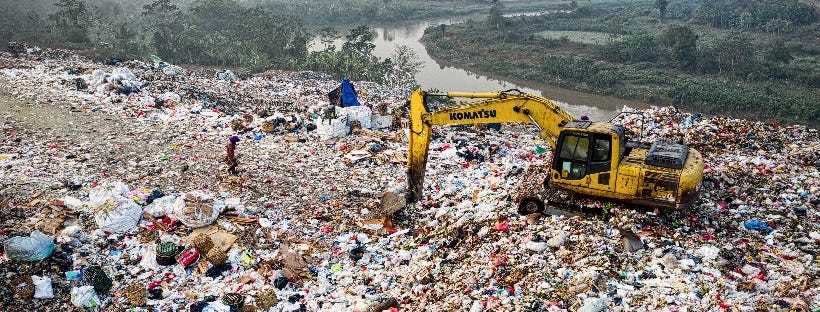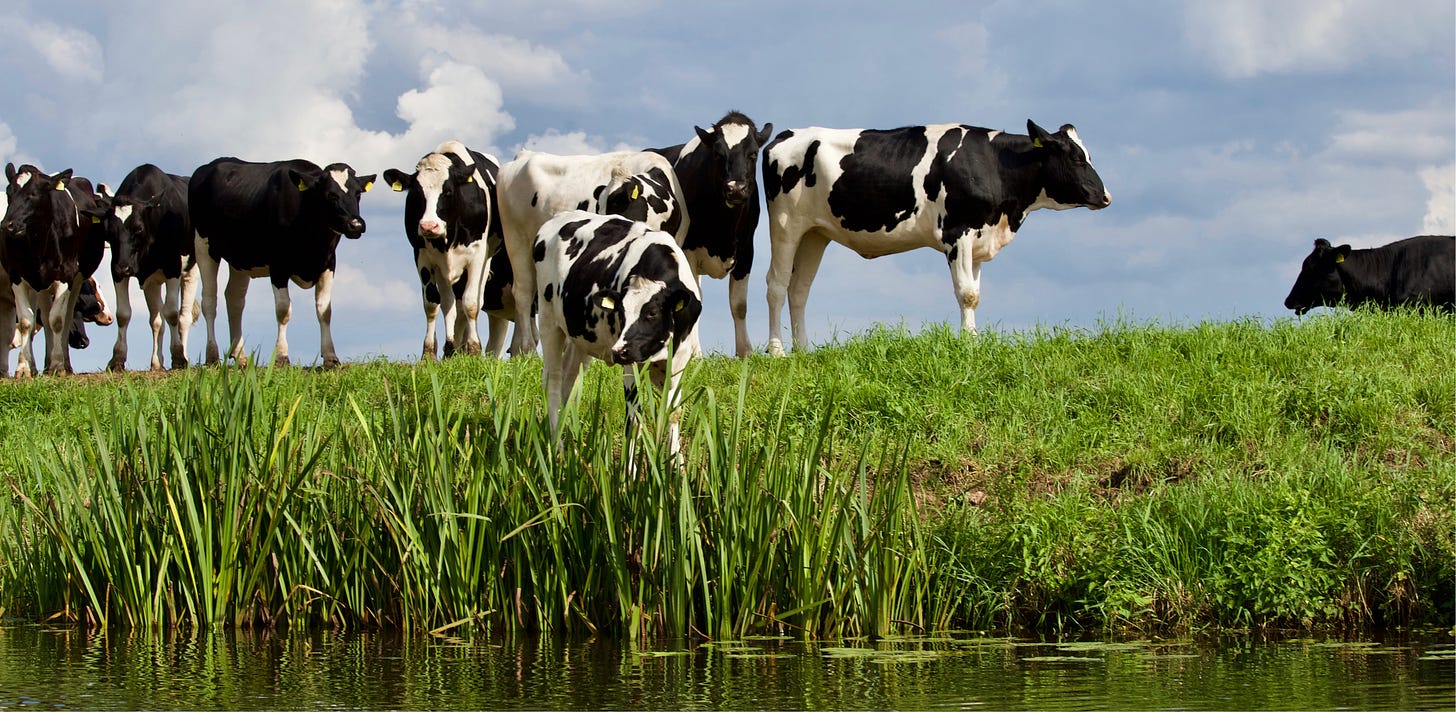Why cutting methane can't wait, and what you can do to help.
If we cut human-produced methane by 45 percent in this decade, we can avoid 0.3 degrees Celsius of warming.
When talking about the greenhouse gasses that cause climate change, most attention goes to CO2, and the most mentioned cause is the burning of fossil fuels. It makes a relatively complex story much easier to explain. But after decades without meaningful action by the world's leaders in both politics and industry, the climate crisis has now grown so enormous and so urgent that we no longer have the luxury of only focussing our actions on the main greenhouse gas and its primary source.

Methane is another one of the greenhouse gasses. It differs from CO2 in many ways; on a 20 years timeline, it is 84 times more effective at trapping heat in our atmosphere than CO2, but it breaks down much faster than CO2 that can stay in the atmosphere for centuries. Methane is responsible for about 30 percent of the global temperature rise we have seen so far.
New report
A new report focuses on the importance of cutting human-caused methane emissions to slow down global warming. If we manage to cut the methane that we, including the fossil fuel industry, produce by 45 percent in this decade, we could avoid 0.3 degrees Celsius of warming.
There are lots of bonuses for acting on this report other than those all-important 0.3 degrees. For instance, we would save hundreds of thousands of lives by improving air quality (not including the extra lives saved by fewer extreme weather disasters). We would enhance food security, create jobs, and maintain labor productivity because of less heat stress.
You can download the full report of the Climate and Clean Air Association in cooperation with UN Environment or choose the more accessible Executive Summary for Decision Makers here.
If you don't feel like diving into reports, there are lots of good articles published about this research, but for a quick read; these are the main points to know:
If we don't urgently take action on methane, we will not reach the Paris Agreement limits of well below 2, and preferable 1.5 degrees Celsius.
Methane production continues to rise, despite all the lockdowns during the pandemic.
The primary sources of human-made methane pollution are agriculture (40%), the fossil fuel industry (34%), and the waste sector (20%).
There is a lot of low-hanging fruit: rapid and significant reductions are possible; we have the knowledge, technology and we can do it at a low cost.
At little to no costs, leaks in oil and gas wells and transmission lines could be plugged, which often pays for itself.
The expansion of natural gas use is not a solution to the climate crisis but contributes to the problem.
If you wonder what you can do, these are some of my suggestions:
Vote for a party that cares about the environment. As a rule of thumb, these are usually the parties that care about you, education for your kids, your healthcare, and social security. You will find them in your country, assuming that you live in a country where you can vote, so choose the right package deal of sound policies.
Eat less meat and use less dairy products. Preferably none at all. If you can't, or won't, try to avoid beef. And try to introduce meatless Mondays. It is suitable for your health, the health of our planet and causes less animal suffering. You don't have to change your cooking dramatically. I doubt if you taste a difference if you make pasta with a plant-based substitute for minced meat. An interesting test: don't tell those who join you at dinner and wait for anyone noticing.
Consume less, not just less food; everything. It sounds simple, but one of the problems on our planet is that we keep consuming more and more. That means more resources, more production, more energy used, more transport, and ultimately more waste.
When you consume, and I know we all do every day, try to be more responsible in your choices. It requires a separate article, but in short: don't buy more food than you need, don't throw it away, use energy-efficient light bulbs, use renewable energy, insulate your house, buy local, and there are dozens of other things you can do.
The main conclusion for me on the methane assessment is that we have another report by experts that tells us that we can solve the climate change challenge, know how to do it, and have the technology. We can afford to take the urgent and effective action needed, but we can't afford not to act. There are loads of additional benefits of taking action.
What we need are leaders that accept the urgency and seriousness of this crisis. In short: leaders that lead in your interest. I don't think that is too much to ask.
If you enjoy reading The Planet, you help other readers and me if you do one of the following:
If you don’t receive this newsletter yet, please sign up to receive it in your inbox. More signups make this publication more visible, and you have something to read while you drink your coffee.
If you have signed up and still like it, please consider taking a subscription. If you can’t afford it, please stay and keep reading. I try to keep most articles in front of the paywall, accessible to all.
If you have subscribed, you already made me happy. Stay, enjoy, comment, and consider giving a subscription to your friends (some readers did, I love that).
Notes:
https://www.unep.org/resources/report/global-methane-assessment-benefits-and-costs-mitigating-methane-emissions
https://www.theguardian.com/environment/2021/may/06/cut-methane-emissions-rapidly-fight-climate-disasters-un-report-greenhouse-gas-global-heating
https://www.bbc.com/news/science-environment-56933443
My thanks for the photos go to (follow them on social media or the photo sites):
John Bakator on Unsplash who made the beautiful picture of the methane bubbles. He wrote: These are methane bubbles trapped in ice. I only heard about this recently and decided to go see them at Abraham Lake near the Banff National Park border. So three hours later, I was there marching out to the middle of the lake trying to find a clearing in the snow when at last I came upon this window into the lake. I could only imagine these bubbles coming to the surface in spring, and if someone isn’t careful, these can be set on fire!!
Tom Fisk from Pexels made the photo of the waste belt in South Tangarang, Indonesia
The cows were photographed by Matthias Zomer from Pexels






Good morning Alexander, an other pretty day in store . . . 🌻
The picture of the methane bubbles captured in the Ice is amazing!
And yes, I have seen videos of people lighting up natural methane sources, including under water on the ocean floor!
I learned that when there is a very dense methane escape(An Earthly burp) from the ocean floor to the surface, the water buoyancy becomes less reliable when dense with methane bubbles. Therefore (can) becomes not sufficient any more to support a ship. The ship sinks through the methane bubbles. A possible story for ships that have mysteriously gone missing.
We got to do better with managing our personal environ(s), it makes me think about this 'Want not. Waste not' webinar you were in. I like this slogan (-:
My question, still is, what are we going to to do with our todays overwhelming waste collections, Ouch!
10 Reasons why burning waste for energy is a bad idea
Posted by jo | 14 Oct 2014
https://ntn.org.au/10-reasons-why-burning-waste-for-energy-is-a-bad-idea/
I'm reading about fancy Restaurants that are going meatless, Bravo!! Save the 🐄
Those methane bubbles are equally fascinating and scary. I think it was in one of your tweets that I first heard/read about them.
Cows always come to mind when I hear methane. We love our cows here in Switzerland and all the cheese and chocolate are keeping me from going vegan - for now ... but that's a work in progress.